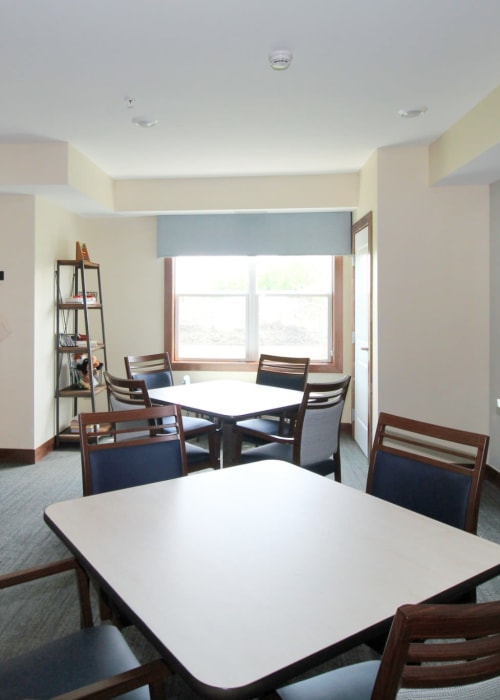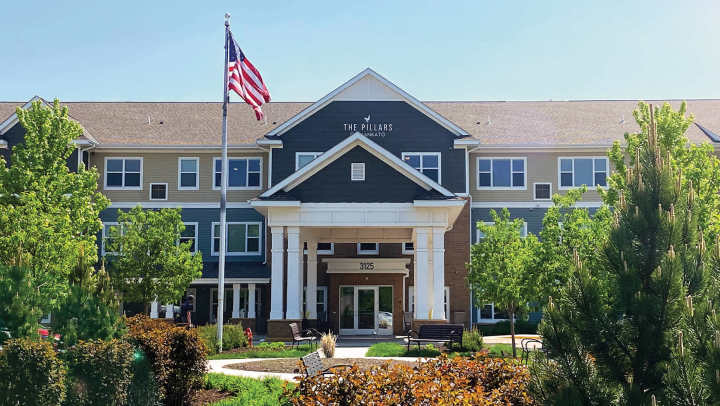Finding the Right Memory Care Community- A Comprehensive Guide
The decision to consider memory care is more than just finding a new place to live. It’s a chance to reimagine love in the face of cognitive decline. It's about learning to connect when shared histories begin to fade, and finding new ways to show love when words no longer work.
When you first notice your loved one struggling to recall a cherished memory or fumbling with once-familiar tasks, it can be unsettling. As you navigate their memory loss together, the journey might feel uncertain and overwhelming. There will be new challenges, but there will also be unexpected moments of grace.
If you're reading this, you're probably standing at a crossroads, your heart heavy with questions and your mind clouded with doubt. Know that you're not alone in this transition. We hope this guide serves as a companion for your journey, offering not just information, but understanding, empathy, and hope.
What Is Memory Care – and Why Does It Matter?
Imagine a place where forgetfulness isn't met with frustration, but with gentle understanding, support, and sometimes redirection. Where wandering isn't seen as a problem to be solved, but as part of a deeper need for familiarity and comfort.
This is the essence of memory care – a philosophy of support that prioritizes safety and emotional well-being for those living with cognitive challenges, including those receiving Alzheimer’s care.
Unlike assisted living, memory care goes beyond adding extra security measures. It's a specialized form of Alzheimer's care that adapts to the changing cognitive needs of its residents. Taking a person-centered approach, it honors the person your loved one has always been, even as their needs change. It fosters an environment where dignity, engagement, and security coexist.
How Is Memory Care Different from Assisted Living?
The lines between senior living, assisted living and memory care can sometimes blur, like the edges of a watercolor painting. While all offer support, memory care takes a more specialized, proactive approach:
-
Assisted living helps with daily tasks, but memory care anticipates needs based on subtle behavioral cues.
-
Activities in assisted living offer social engagement, while memory care crafts experiences rooted in personal history and remaining abilities.
-
Security is a priority in all senior living settings, but memory care balances safety with the freedom to explore within structured boundaries.
Memory care isn't just about helping with daily routines – it’s about understanding the deeper reasons behind behaviors. A missed meal might not be about hunger, but rather, a lost connection to the act of eating. Wandering isn’t random; it’s often a search for something familiar. Specialized care meets these needs with empathy rather than frustration.
Key Factors to Consider When Choosing a Memory Care Community
The People: Staff and Caregivers
Memory care staff are more than caregivers – they are the emotional anchors of the community. A well-trained team can turn moments of confusion into moments of comfort.
When evaluating a community, observe the everyday interactions. Do caregivers display patience? Are their voices warm and reassuring? Are they truly engaged, or just completing a task?
Staff-to-resident ratios matter, but consistency is just as important. A strong memory care community ensures that residents regularly see the same caregivers, fostering trust and emotional security. While technical training is vital, true expertise lies in human connection. The best caregivers understand that words aren’t always necessary – a reassuring touch or a familiar presence can provide more comfort than an explanation.
A Safe and Secure Environment
Safety in memory care is a delicate balance – a tightrope walk between protection and freedom. The best communities don't just prevent wandering; they create spaces that invite exploration within secure boundaries.
Look for environments that feel like home, not hospitals. Secured exits should blend seamlessly into the decor, while enclosed courtyards offer the embrace of nature without risk. Subtle design elements (like color-coded hallways or memory boxes outside room doors) become silent guides, helping residents navigate their world with confidence.
But true security goes beyond locked doors. It's found in the peace of mind that comes from knowing your loved one is in a setting where their safety and dignity are protected.
Engagement and Activities: More Than Just Passing Time
In the task of memory care, activities do more than fill hours. They can fill hearts and minds with purpose. The best programs don't just occupy residents; they engage them in ways that resonate with their personal histories and preserved abilities.
Look for communities that offer a rich tapestry of experiences:
-
Music therapy that awakens long-forgotten memories
-
Art classes that provide a canvas for self-expression when words fail
-
Gentle exercise programs that keep bodies active and spirits lifted
The key is personalization. A good community will take the time to learn each resident's story, tailoring activities to individual interests and abilities. They understand that engagement isn't one-size-fits-all, but rather, as unique as each person in their care.
Dining and Nutrition: Supporting Health with Dignity
Mealtime in memory care is about more than nutrition. It's a sensory experience, a social event, and an opportunity for independence. The best communities recognize that as cognitive abilities change, so too must the approach to dining.
Look for dining rooms that buzz with conversation and laughter, where residents are encouraged to make choices and maintain independence for as long as possible. Observe how staff assist those who need help – is it done with respect and discretion?
Ask about menu variety and how dietary needs are accommodated. The best communities offer finger foods for those who struggle with utensils, vibrant plates that stimulate appetite, and flexible dining times that honor individual rhythms.
Medical Support and Long-Term Care Considerations
As needs evolve, so should the level of medical support available. The ideal community offers a continuum of care, seamlessly adapting to changing health requirements without uprooting residents from their established community.
Inquire about on-site medical staff and their availability. How are medications managed? What happens in case of a health emergency? The best communities have clear protocols and strong relationships with local hospitals and specialists.
Consider the long view: how does the community handle the progression of dementia? Are there different levels of care within the same community? The goal is to find a place that can be a true home for your loved one, capable of meeting their needs now and in the future.
Visiting and Evaluating Memory Care Communities
Schedule Tours and Ask Questions
Choosing a memory care community is like selecting a new world for your loved one to inhabit. It's a decision that deserves time, attention, and multiple visits. Don't just schedule one tour, but plan to visit at different times of day to get a full picture of daily life.
As you walk through, engage all your senses. What do you see? Residents engaged in activities or sitting idly? What do you hear? Laughter and conversation or silence? What do you smell? Fresh, clean air or less pleasant odors?
Ask questions that go beyond the surface:
-
How does the community handle difficult behaviors?
-
What's the philosophy on using medications to manage symptoms?
-
How are families kept informed and involved in care decisions?
Look Beyond the Brochure
Marketing materials can paint a rosy picture, but the true measure of a community is found in the small moments. Watch how staff interact with residents when they think no one is looking. Are they patient and kind, or rushed and impersonal?
Pay attention to the residents themselves. Do they appear well-groomed and content? Are they engaged in activities or left to their own devices?
Red flags might include overworked staff, strong odors, or a lack of engaging activities. Trust your instincts. If something feels off, it probably is.
Review Licensing and Accreditation
While the heart of care is in human interaction, the backbone is in the credentials. Ensure the community meets all state licensing requirements. Look for additional accreditations from respected organizations like the Joint Commission or CARF, which indicate a commitment to high standards of care.
Don't hesitate to ask for documentation of these credentials. A reputable community will be proud to share this information and explain what it means for the quality of care they provide.
Making the Transition: Helping Your Loved One Adjust
Managing the Emotional Impact
The decision to move a loved one into memory care often comes with a tidal wave of emotions like guilt, relief, sadness, hope. Recognize that these feelings are normal and valid. You're not giving up; you're ensuring your loved one receives the specialized care they need.
Consider joining a support group for caregivers. Sharing experiences with others who understand can be incredibly healing and provide practical advice for navigating this transition.
Personalizing Their Space
Creating a familiar environment can ease the transition. Bring cherished photos, a favorite blanket, or familiar decorations to make their new space feel like home. Work with staff to create a room that's both comforting and safe.
Remember, less is often more in memory care. Too many items can be overwhelming or confusing. Choose a few meaningful pieces that bring comfort without clutter.
Staying Involved
Your role as a caregiver doesn't end when your loved one moves into memory care—it evolves. Stay involved in their care, visit regularly, and build relationships with the staff. Many communities offer family support groups and educational programs to help you stay connected and informed.
Be patient with the adjustment period. It's normal for there to be some difficult days as your loved one settles in. Work closely with staff to address any issues and celebrate the small victories along the way.
Final Thoughts
Choosing a memory care community isn’t just a practical decision – it’s an act of love. You’re ensuring that your loved one receives the specialized senior care and support they need to live with dignity and comfort. The right environment should nurture their well-being, not just meet their needs.
You want a place where they can still experience joy, where safety and warmth go hand in hand. It’s about finding a setting that values who they are, not just who they used to be.
As you navigate this path, be gentle with yourself. You’re making a decision born of love and a desire for the best possible care. Trust in the process, seek guidance, and listen to both expert advice and your own intuition. When choosing memory care, remember that the right facility isn’t just a place. It’s a partner in care, a source of support, and a new chapter in your loved one's story. Schedule a tour of our Memory Care Community today!


